
"When I moved to Australia more than five years ago, I experienced for the first time the pleasures and safety of being able to go on a night stroll by myself something I had never done in my home country. Then as I heard the stories of violence against women, on the streets and homes across Australia (and the world), I realised that as a woman you don't get to feel a sense of belonging in most places. I learned to accept that."
"I have become comfortable in referring to this country as us and we in my everyday conversations (and even throughout this article) despite the knowledge I have to regularly navigate an increasingly complex visa system, pay ridiculous visa fees and take the English test every couple of years so I can continue serving with my time, effort and skills. Over the five years, I have learned to accept this country as my own."
I arrived in Australia over five years ago and first experienced safe night walks. I later learned that gender-based violence and safety concerns limit a woman's sense of belonging. Recently I felt unsafe because of racial hostility witnessed in broad daylight. I work nine-to-five in foreign policy, study part-time, pay full tuition and taxes, and meet costly visa and health insurance requirements, yet avoid doctors because care remains unaffordable. I have embraced Melbourne, cheered sporting victories, and used inclusive language, while also navigating English tests, visa fees and uncertainty. The experience exposed exclusion despite contribution and belonging.
Read at www.theguardian.com
Unable to calculate read time
Collection
[
|
...
]